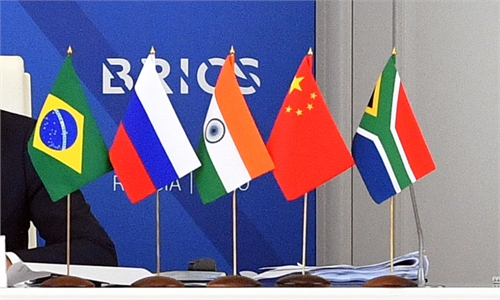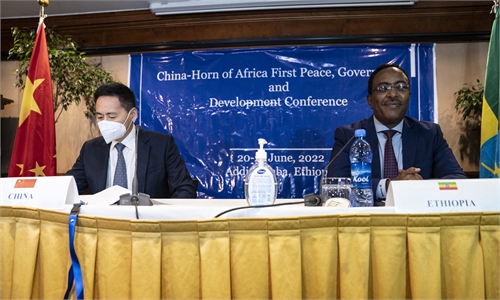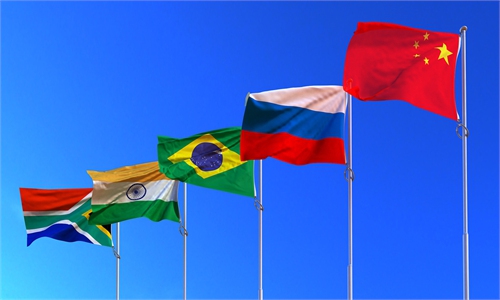IN-DEPTH / DIPLOMATIC CHANNEL
Genuine multipolar order advocated by BRICS allows greater levels of dialogue to address challenges: former S.African envoy
Editor's Note:
The 14th BRICS Summit will kick off on Thursday. The Summit will be held in virtual format under the theme of "Foster High-quality BRICS Partnership, Usher in a New Era for Global Development." When the world is plagued by a pandemic, hunger, war, and division among many others, the BRICS members and a big number of emerging markets and developing countries will jointly demonstrate to the world the BRICS spirit of "openness, inclusiveness, and win-win cooperation."
On the occasion of the Summit, the Global Times interviewed Argentina's Ambassador to China Sabino Vaca Narvaja and Gert Grobler, a former senior South African diplomat, on the importance they attach to the multilateral mechanism.
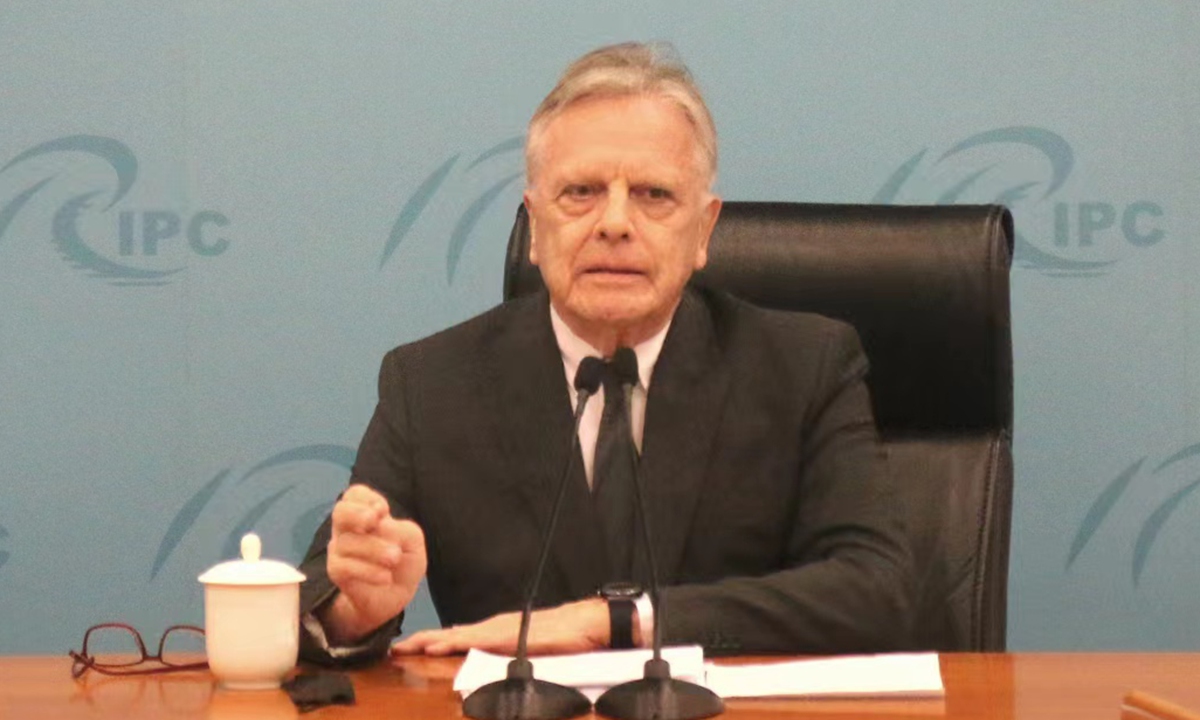
BRICS states are bringing economic and political clout to international relations during a period when the old Western-centric world system is under pressure to transform, and China is believed to be a linchpin in a much-needed economic dynamism and a key driver for inclusive global governance, Gert Grobler, a former senior South African diplomat, who served as an ambassador to Spain, Japan, and Madagascar, told the Global Times in a recent exclusive interview.
The BRICS summit is taking place against the background of increasing challenges such as weak global leadership, dismal economic growth, unilateralism, and the fueling of geopolitical tensions which affect world peace and stability, he said. "BRICS, however, has never had the intention to create an exclusive elite group but to jointly harness a common vision and its resources to benefit all its people through concrete mutual cooperation and to actually strengthen international cooperation toward a people-centered, better world."
Grobler has high expectations over the bloc, reiterating that "the role of BRICS in the global governance system is destined to steadily increase as the countries have transformed a purely economic concept - BRICS - into a new and global governance institution."
"BRICS states bring economic and political clout to international relations during a period when the old Western-centric world system is under pressure to transform," Grobler said.
At the virtual meeting of BRICS ministers on May 19, member states reiterated their commitment to enhancing and improving global governance by promoting a more agile, effective, efficient, representative, and accountable system; exercising inclusive consultation and collaboration for the benefit of all on the basis of respecting sovereignty, independence, territorial integrity, equality, and the legitimate interests and concerns of different countries.
All this suggests that intra-BRICS cooperation is here to stay in the transition toward genuine multipolarity, not only economically but also militarily, and regarding agenda-setting capacity, said Grobler.
BRICS is convinced that such a multipolar order will be far more democratic than any previous order in global history, allowing greater levels of genuine dialogue, a broader distribution of knowledge, and more innovative and effective ways to address global challenges toward a better world, he said.
Grobler said the BRICS summit is taking place against the background of an increasingly changing and uncertain world with problems and challenges such as weak leadership, inadequate economic growth, unilateralism, protectionism, hegemonism, power politics, and the fueling of geopolitical tensions that affect world peace and stability.
"Although these issues are all interlinked, the responses by the international community to these global challenges have sadly been woefully inadequate and fragmented," he said. China, as a valued and key BRICS member, has already concretely proven that it will actively continue to be a significant provider of much needed economic dynamism and act as a key driver for inclusive and just global governance, he believes.
It is against this background of an "uncertain world" that the Chinese-initiated concept of a common vision and dream to build a community of a shared future for mankind stands out.
There is an already growing consensus among China, BRICS, and other international partners on future cooperation on all these constructive Chinese initiatives.
Grobler believes that BRICS will continue to provide support for improving global economic governance, promoting multilateralism, maintaining the multilateral trading system with the WTO as the cornerstone, improving the international financial and monetary system, and making economic globalization more open, inclusive, balanced, and beneficial for all.
Skepticism and pessimism about BRICS have never stopped, such as the West's long-standing criticism of BRICS countries for not joining in their "Russia-bashing" campaign, or predicting a so-called "sooner-or-later split" among the members.
"Contradicting all expectations of the eventual weakening of the bloc, BRICS member states continue to work in a committed fashion toward strengthening cooperation. BRICS not only continues to exist but has also started a process of institutionalization, leading to regular ministerial meetings in areas such as economy, finance, science and technology, education, health, security, and many others. Critics of BRICS who thought that its formation would be another talk shop, have been proven wrong. BRICS is a goal-oriented formation with continuity, concrete, and tactical actions," Grobler suggested.
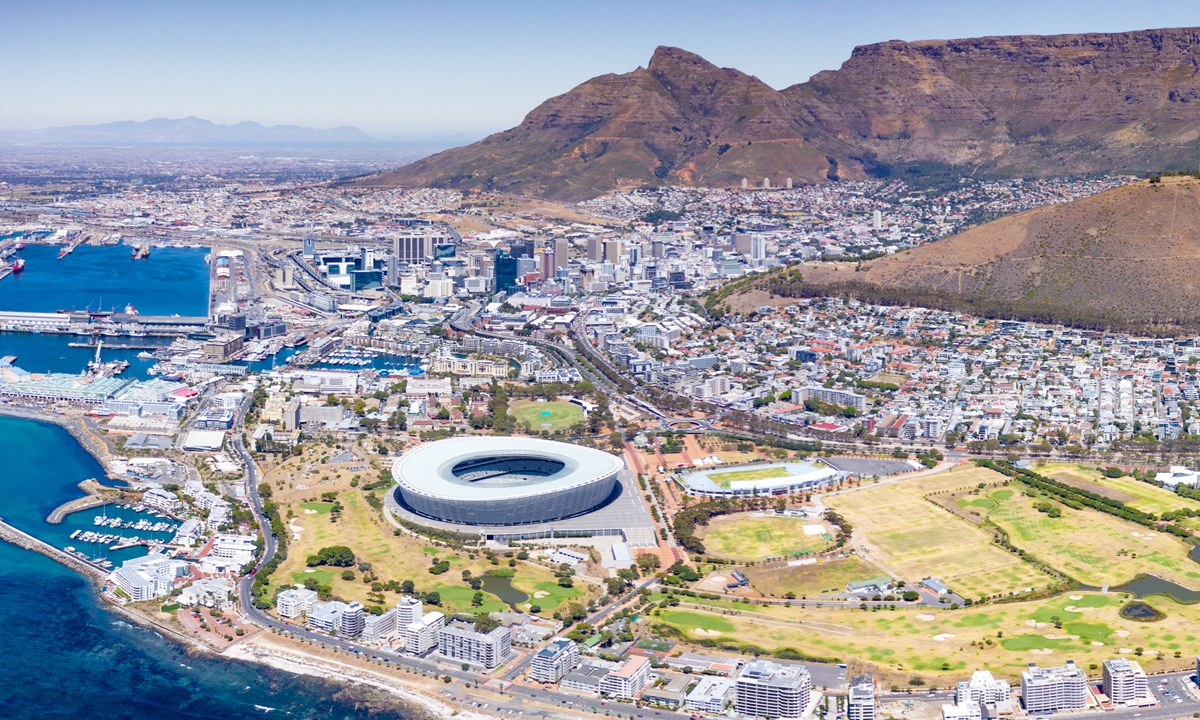
BRICS' boundless potential
Data shows that South Africa's bilateral trade has substantially grown, particularly in commodity and agricultural exports and manufactured goods imports, particularly with China and India. "This is not surprising since China is the proverbial engine room of intra-BRICS trade," he suggested.
Supported by funds from the National Development Bank, whose regional office is located in Johannesburg, South Africa has been a beneficiary of financing and technical support for major projects in combating the pandemic, transportation, clean energy, environmental protection, water infrastructure, and greenhouse gas emission reduction.
Grobler said that South Africa and other BRICS countries have developed a deep respect and admiration for the profound changes in China under the leadership of the Communist Party of China (CPC).
"It is no wonder that BRICS and many others regard China's development as an opportunity for the world rather than a threat," he said.
With the growth rate of exports among them exceeding the global average since its inception, BRICS countries have made important contributions to promoting global economic recovery and high-quality development.
According to official data, BRICS countries, together, represent about 42 percent of the global population, 24 percent of global GDP, 30 percent of the world's territory, and 18 percent of global trade.
In recent years, BRICS countries have maintained a strong economic and trade cooperation momentum. With a combined market of $16.46 trillion, BRICS now forms almost 15 percent of the world's market capitalization of $112.43 trillion, according to Goldman Sachs.
"Therefore the economic implications for BRICS from the Russia-Ukraine conflict and how to deal with unilateral sanctions imposed by the West against Russia, as well as cooperation among member states to combat the COVID-19 pandemic will, amongst others, be key items on the agenda of the BRICS summit," said Grobler.
Tangible benefits to South Africa
South African President Cyril Ramaphosa said on June 10 that his country wants to see "a greater and deeper partnership" with other BRICS members which is an attractive bloc that many other countries have confidence in. He especially spoke highly of the partnership between China and South Africa, saying China is "a country [with] which we have a strategic relationship at the highest level."
South Africa joined the important bloc of emerging economies in December 2010, in line with the country's foreign policy to strengthen South-South cooperation, which Grobler called "a milestone" in South Africa to advance its national development priorities and to "strengthen its activism on the global stage."
"Specifically, being part of BRICS enabled the country to employ additional and powerful tools in its fight to address its domestic triple challenges of unemployment, poverty, and inequality through increased trade, investment, tourism, capacity building, skills, and technology transfers, particularly to address its post-pandemic economic recovery," said Grobler.
The 14th BRICS Summit will kick off on Thursday. The Summit will be held in virtual format under the theme of "Foster High-quality BRICS Partnership, Usher in a New Era for Global Development." When the world is plagued by a pandemic, hunger, war, and division among many others, the BRICS members and a big number of emerging markets and developing countries will jointly demonstrate to the world the BRICS spirit of "openness, inclusiveness, and win-win cooperation."
On the occasion of the Summit, the Global Times interviewed Argentina's Ambassador to China Sabino Vaca Narvaja and Gert Grobler, a former senior South African diplomat, on the importance they attach to the multilateral mechanism.

Gert Grobler Photo: VCG
BRICS states are bringing economic and political clout to international relations during a period when the old Western-centric world system is under pressure to transform, and China is believed to be a linchpin in a much-needed economic dynamism and a key driver for inclusive global governance, Gert Grobler, a former senior South African diplomat, who served as an ambassador to Spain, Japan, and Madagascar, told the Global Times in a recent exclusive interview.
The BRICS summit is taking place against the background of increasing challenges such as weak global leadership, dismal economic growth, unilateralism, and the fueling of geopolitical tensions which affect world peace and stability, he said. "BRICS, however, has never had the intention to create an exclusive elite group but to jointly harness a common vision and its resources to benefit all its people through concrete mutual cooperation and to actually strengthen international cooperation toward a people-centered, better world."
Grobler has high expectations over the bloc, reiterating that "the role of BRICS in the global governance system is destined to steadily increase as the countries have transformed a purely economic concept - BRICS - into a new and global governance institution."
"BRICS states bring economic and political clout to international relations during a period when the old Western-centric world system is under pressure to transform," Grobler said.
At the virtual meeting of BRICS ministers on May 19, member states reiterated their commitment to enhancing and improving global governance by promoting a more agile, effective, efficient, representative, and accountable system; exercising inclusive consultation and collaboration for the benefit of all on the basis of respecting sovereignty, independence, territorial integrity, equality, and the legitimate interests and concerns of different countries.
All this suggests that intra-BRICS cooperation is here to stay in the transition toward genuine multipolarity, not only economically but also militarily, and regarding agenda-setting capacity, said Grobler.
BRICS is convinced that such a multipolar order will be far more democratic than any previous order in global history, allowing greater levels of genuine dialogue, a broader distribution of knowledge, and more innovative and effective ways to address global challenges toward a better world, he said.
Grobler said the BRICS summit is taking place against the background of an increasingly changing and uncertain world with problems and challenges such as weak leadership, inadequate economic growth, unilateralism, protectionism, hegemonism, power politics, and the fueling of geopolitical tensions that affect world peace and stability.
"Although these issues are all interlinked, the responses by the international community to these global challenges have sadly been woefully inadequate and fragmented," he said. China, as a valued and key BRICS member, has already concretely proven that it will actively continue to be a significant provider of much needed economic dynamism and act as a key driver for inclusive and just global governance, he believes.
It is against this background of an "uncertain world" that the Chinese-initiated concept of a common vision and dream to build a community of a shared future for mankind stands out.
There is an already growing consensus among China, BRICS, and other international partners on future cooperation on all these constructive Chinese initiatives.
Grobler believes that BRICS will continue to provide support for improving global economic governance, promoting multilateralism, maintaining the multilateral trading system with the WTO as the cornerstone, improving the international financial and monetary system, and making economic globalization more open, inclusive, balanced, and beneficial for all.
Skepticism and pessimism about BRICS have never stopped, such as the West's long-standing criticism of BRICS countries for not joining in their "Russia-bashing" campaign, or predicting a so-called "sooner-or-later split" among the members.
"Contradicting all expectations of the eventual weakening of the bloc, BRICS member states continue to work in a committed fashion toward strengthening cooperation. BRICS not only continues to exist but has also started a process of institutionalization, leading to regular ministerial meetings in areas such as economy, finance, science and technology, education, health, security, and many others. Critics of BRICS who thought that its formation would be another talk shop, have been proven wrong. BRICS is a goal-oriented formation with continuity, concrete, and tactical actions," Grobler suggested.

Cape Town Photo: VCG
BRICS' boundless potential
Data shows that South Africa's bilateral trade has substantially grown, particularly in commodity and agricultural exports and manufactured goods imports, particularly with China and India. "This is not surprising since China is the proverbial engine room of intra-BRICS trade," he suggested.
Supported by funds from the National Development Bank, whose regional office is located in Johannesburg, South Africa has been a beneficiary of financing and technical support for major projects in combating the pandemic, transportation, clean energy, environmental protection, water infrastructure, and greenhouse gas emission reduction.
Grobler said that South Africa and other BRICS countries have developed a deep respect and admiration for the profound changes in China under the leadership of the Communist Party of China (CPC).
"It is no wonder that BRICS and many others regard China's development as an opportunity for the world rather than a threat," he said.
With the growth rate of exports among them exceeding the global average since its inception, BRICS countries have made important contributions to promoting global economic recovery and high-quality development.
According to official data, BRICS countries, together, represent about 42 percent of the global population, 24 percent of global GDP, 30 percent of the world's territory, and 18 percent of global trade.
In recent years, BRICS countries have maintained a strong economic and trade cooperation momentum. With a combined market of $16.46 trillion, BRICS now forms almost 15 percent of the world's market capitalization of $112.43 trillion, according to Goldman Sachs.
"Therefore the economic implications for BRICS from the Russia-Ukraine conflict and how to deal with unilateral sanctions imposed by the West against Russia, as well as cooperation among member states to combat the COVID-19 pandemic will, amongst others, be key items on the agenda of the BRICS summit," said Grobler.
Tangible benefits to South Africa
South African President Cyril Ramaphosa said on June 10 that his country wants to see "a greater and deeper partnership" with other BRICS members which is an attractive bloc that many other countries have confidence in. He especially spoke highly of the partnership between China and South Africa, saying China is "a country [with] which we have a strategic relationship at the highest level."
South Africa joined the important bloc of emerging economies in December 2010, in line with the country's foreign policy to strengthen South-South cooperation, which Grobler called "a milestone" in South Africa to advance its national development priorities and to "strengthen its activism on the global stage."
"Specifically, being part of BRICS enabled the country to employ additional and powerful tools in its fight to address its domestic triple challenges of unemployment, poverty, and inequality through increased trade, investment, tourism, capacity building, skills, and technology transfers, particularly to address its post-pandemic economic recovery," said Grobler.

